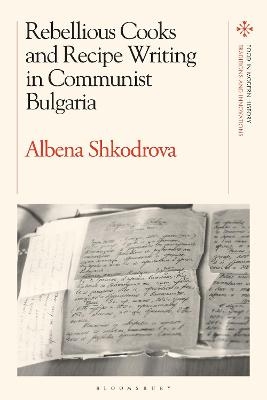
Rebellious Cooks and Recipe Writing in Communist Bulgaria
Seiten
2022
Bloomsbury Academic (Verlag)
978-1-350-20544-4 (ISBN)
Bloomsbury Academic (Verlag)
978-1-350-20544-4 (ISBN)
How did people exist and resist in their daily lives under Soviet control in the Cold War period? Shkodrova's monograph shows how in communist Bulgaria many women passionately exchanged recipes with friends and strangers, to build substantial and impressive private collections of recipes. This activity was borderline contraband in going against the general disapproval of home cooking that formed part of the ideology of communism, in which home cooking was considered household slavery and an agent of patriarchalism.
Private recipe collections were by far the preferred written source of culinary information, more popular than the state-approved commercial cookbooks. Shkodrova shows how these recipe collections held many different meanings for the women who collected them, from helping to navigate the communist economy, to enabling new friendships to be developed while engaging safely in power relations, and cultivating a sense of individual identity in a society where collective existence was prioritised and exalted. Drawing on primary sources including scrapbook cookbooks and working from the establishment of cookery classes before communism and their obliteration thereafter, Shkodrova presents a structured outline of the meanings of recipes exchange and home cooking for Bulgarian women under communism.
Private recipe collections were by far the preferred written source of culinary information, more popular than the state-approved commercial cookbooks. Shkodrova shows how these recipe collections held many different meanings for the women who collected them, from helping to navigate the communist economy, to enabling new friendships to be developed while engaging safely in power relations, and cultivating a sense of individual identity in a society where collective existence was prioritised and exalted. Drawing on primary sources including scrapbook cookbooks and working from the establishment of cookery classes before communism and their obliteration thereafter, Shkodrova presents a structured outline of the meanings of recipes exchange and home cooking for Bulgarian women under communism.
Albena Shkodrova is a Research Fellow at KU Leuven in Belgium.
Introduction: The Bulgarian Cookbooks Samizdat
1. Between Communist Feminism and Patriarchy
2. The Practical Value of a Scrapbook
3. The Social Powers of Recipes and Cooking
4. “I Cooked with Pleasure”
Conclusion. (To Communist Women) Cooking Made Sense
| Erscheinungsdatum | 08.02.2021 |
|---|---|
| Reihe/Serie | Food in Modern History: Traditions and Innovations |
| Zusatzinfo | 12 bw illus |
| Verlagsort | London |
| Sprache | englisch |
| Maße | 156 x 234 mm |
| Themenwelt | Sachbuch/Ratgeber ► Essen / Trinken ► Länderküchen |
| Geschichte ► Allgemeine Geschichte ► Zeitgeschichte | |
| Geschichte ► Teilgebiete der Geschichte ► Kulturgeschichte | |
| Sozialwissenschaften | |
| Technik ► Lebensmitteltechnologie | |
| ISBN-10 | 1-350-20544-3 / 1350205443 |
| ISBN-13 | 978-1-350-20544-4 / 9781350205444 |
| Zustand | Neuware |
| Haben Sie eine Frage zum Produkt? |
Mehr entdecken
aus dem Bereich
aus dem Bereich
Gewalt, Umwelt, Identität, Methode
Buch | Softcover (2024)
Spector Books OHG (Verlag)
CHF 49,95
wie Freud im Kollektiv verschwand
Buch | Hardcover (2024)
Klett-Cotta (Verlag)
CHF 34,95


